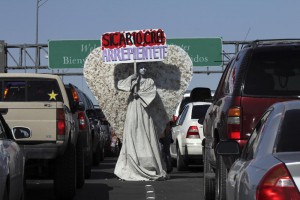Jesus said to them… “But in those days, after that suffering, the sun will be darkened and the moon will not give its light, and the stars will be falling from heaven, and the powers in the heavens will be shaken.” (Mark 13:24–25)
These were among the words that greeted the Christian New Year a couple of Sundays ago, the beginning of the Advent season. Well, dang, commented some of us who meet after the 9 a.m. service at All Saints’ Episcopal Church to discuss the readings. We might as well fold up our tents and go home if this is what the season’s bringing.
By the end of the discussion, we surprised ourselves by agreeing that there’s something oddly reassuring about the passage in which these verses are embedded, despite the Episcopalian squeamishness often evoked by the apocalyptic Jesus. All this talk about judgment and suffering is fine coming from John the Baptist—what can you expect from someone who eats locusts? When Jesus talks about judgment and end times, however, I get linear, literal, and cross. The world didn’t end. Jesus was wrong. Untrustworthy. Oh, forget it. I’ll just sit here alone in the dark.
But eventually I have to note the quotation marks around the darkness-coming passage, which means that Jesus is not just throwing wild predictions around. He’s quoting scripture, from the times when other prophets saw God’s people careening off toward the wilderness without so much as a water bottle. The world did not come to an end after Isaiah used this imagery eight centuries before Jesus used it, something Jesus probably noticed. Nor did it come to an end after Ezekiel or Joel used it in the interim centuries. It was (and is) poetic language used to jolt people out of their open-eyed, daylight sleepwalking. Wake up! There is darkness around and within us, but it’s not what we think it is. There is light as well, and it too is often not what we think it is.
In Ciudad Juárez, Mexico’s most violent border city, angels have taken to landing at crime scenes, at busy intersections, even on the International Bridge. They stand about ten feet tall, with wide feathered wings, and carry signs that say things like “Murderers, Believe and Repent.” The fact that these angels are actually teenaged members of Salmo 100 (Psalm 100), a tiny evangelical church, doesn’t make them any less impressive: in fact, I think it makes them even more so. Frustrated with the lethal violence that flays their city and with the flabby ineffectiveness of public policy, these young people persuaded the city to donate old office curtains that they turned into robes, raised money for make-up and feathers, and began their work of shocking people awake—particularly those who continue to perpetrate and permit the demonic activities that so plague the city. Their performances are beautiful and dangerous: they stand without speaking, without means of defense, in places where they are very likely to encounter the demonic forces unraveling their world.
They have seen the sun and the moon cease to give light, seen the stars fall from the sky. They have seen the signs that their world is charged with darkness, but they have chosen an energy source beyond the darkness.
Most of us have seen the skies go dark on at one time or another; most of us have had times when it seemed that the world is going to end. What our little discussion group decided that Jesus was saying was that that there are times when the skies go dark and the world seems torn from its course. These times are unavoidable. But don’t think that darkness defines the whole nature of reality, or you’ll pull from a limited energy source, see from a restricted field of vision. Sometimes it takes darkness to remind you that there is light, and that you want to see it.
It’s easy to think about the darkness simplistically. I do it myself, noting the physical and spiritual relief that the pre-solstice days bring from the scorching Texas sun. I’ve noted that most things, including us, need darkness in which to grow. But I also hearken to Wendell Berry’s pithy distillation of the full power of the dark:
To go in the dark with a light is to know the light.
To know dark, go dark. Go without sight,
and find that the dark, too, blooms and sings
and is traveled by dark feet and wings.
Most of us—used to light, to a particular, merely visual way of seeing—have definitions of darkness that are inadequate to its full reality. Although there is blooming in the darkness, there are also things fully worthy of terror. Because we can’t see in the darkness the way we’re used to seeing in the light, we often have trouble discerning what blooms from what bites. And sometimes it’s the same thing.
In his book The Blessing: A Memoir, the poet Gregory Orr recounts the stunning journey of his life into the darkness, beginning when, at the age of twelve, he killed his brother in a hunting accident. His brilliant, erratic, meth-addicted physician father and his depressed mother, who died in surgery a couple of years later, were not able to help lead him through the dark, in which he lived persistently until an incident after he returned to the upstate New York village he called home after a shocking experience with Mississippi state police in a civil rights protest in 1965. When he got back, he found that many of the people he’d known all his life wouldn’t speak to him because of his civil rights work. The darkness he’d lived in deepened; he wore the mark of Cain.
At the end of the summer, before he left to go back to college, one of his high school English teachers invited him on a drive. She took him to the property of a sculptor who had died earlier that year. Ignoring the “No Trespassing” sign on a barbed wire fence, they climbed into a field filled with metal figures, suggestive of but not restricted by human form. He and his teacher wandered for an hour through the field. Thought Orr:
… these were soldiers of art. They brought no mayhem—only a longing to rise up and stand inside meaning as a man might stand in armor. There would be no violent struggles here. This was a field of blessing. A field where the mortal and fallen rose up, transformed…. Here in this field, arrayed in long lines, was an army of art. This army was engaged in a war against the nothingness and indifference of the universe. It wasn’t the kind of war history fought, where timing was everything and the clocks ran on blood. This was a war outside of time. It was a war where you didn’t fight, or march, or do violence to anyone…. Somewhere in this field was a rendering of each agony and exultation [the sculptor] had ever felt. And I could feel them, too. I knew that somewhere in this field Cain stood; somewhere else, his slain brother.
Our discussion group came to an equivalent conclusion about the disturbing, apocalyptic words of Jesus. (At least, I think we did.) He was offering his soon-to-be-tested disciples consolation: do not think that the coming darkness is all there is. His advice to them: stay awake. Stay awake to the angels that land in front of you, insisting that there is a way toward meaning. Stay awake to the power behind love, beauty, forgiveness, and mercy that moves in the dark and beyond it. Do not let the darkness consign you to indifference or despair. Stay awake.
What we’re reading
Heather: Anthony Trollope, Barchester Towers
Martin: Calvin Trillin, Quite Enough of Calvin Trillin: Forty Years of Funny Stuff


Wow. My gratefulness for knowing you just found a new gear.
From Juarez to Wenders with Berry on the way, you have outdone yourself, Ms Sweet Potato. Thank you for the in lightning post today.
What Joy said. Wow. Beautiful. And thank you.
Beautiful, timely post. Thank you for it!
Heather, let’s find a way to work some form of this into our presentation for next year. It is a lovely meditation.
Heather, you are a real writer. I am grateful you share your thoughts and talents with us.
Heather – This moved me in unexpected ways. Thanks for sharing your gifts with us.
Molly and I loved your latest blog post. It’s a perfect meditation for the Advent season. Thank you for sharing!
Stunned again…into a new-felt awareness. Thank you for using your gift of word to enliven the complex mysteries of spirit.
Heather,
You take me outside my comfort zone and make me think. My brain needs the exercise, and you give it lots of fodder for thought.
Susan
Pingback: Love, light, and Wallace Stevens | Madroño Ranch
Oh, my. Where have I been? I’m reading your posts in reverse, having just discovered the wonder of them. What a gift you two are. I LOVE teaching Sunday School to children (including yours in the past) but your blog reminds me of what I could gain by making more effort to connect with the adults who share my orbit. (The Wings of Desire is one of my favorite movies.)